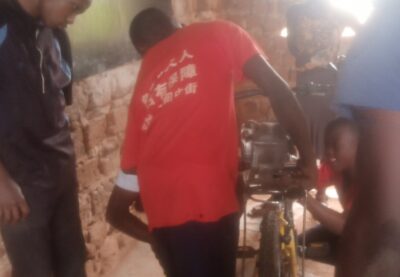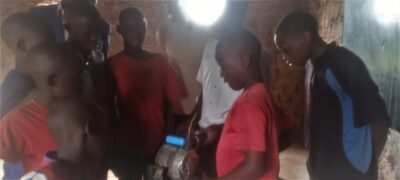Today’s world faces immense challenges—from widespread greenhouse gas emissions, environmental degradation, and rampant climate change to technological knowledge and workforce shortages. Technology and engineering innovations can influence these impacts if we engage key stakeholders and communities. Globally, many organizations are promoting engineering and technology to address these challenges. EPICS in IEEE connects engineering students and communities to address universal challenges by utilizing technology and engineering. One such project supported by the EPICS in IEEE program involved providing clean energy to homes in Uganda while also educating students on the value of learning STEM subjects.
An Affordable Solution
In 2022, EPICS in IEEE funded a project focused on providing affordable clean energy technology while reducing ill health through exercise in Uganda. The project bought together Buganda Royal University engineering students, local high school students, the non-government organization Balandiza Kimezze Women Group, and the community to design and fabricate a bicycle pedal power generator. The purpose of the generator is to reduce ill health and environmental degradation as well as supply reliable and affordable power.
 Due to the low cost, the wide-scale application of the “Paddle Powered Generator” can be a suitable source of renewable energy. The hope is that this project can be replicated and used in the villages as a valuable electricity source for a small family where the family members can charge the battery by paddling for a short time. This will provide electricity when needed and physical exercise for the family.
Due to the low cost, the wide-scale application of the “Paddle Powered Generator” can be a suitable source of renewable energy. The hope is that this project can be replicated and used in the villages as a valuable electricity source for a small family where the family members can charge the battery by paddling for a short time. This will provide electricity when needed and physical exercise for the family.
Developing STEM Career Paths
Since technology is a main factor in worldwide development, it is vital for communities in different parts of the world to pursue the critical path of STEM subjects. While building the “Paddle Powered Generator,” engineering students learned to apply their skills to real-life practice by addressing a community challenge. It also enabled high school students to learn about engineering career paths. Encouraging and fostering STEM practices helps communities to have a dependable resource of problem solvers.
it is vital for communities in different parts of the world to pursue the critical path of STEM subjects. While building the “Paddle Powered Generator,” engineering students learned to apply their skills to real-life practice by addressing a community challenge. It also enabled high school students to learn about engineering career paths. Encouraging and fostering STEM practices helps communities to have a dependable resource of problem solvers.
As part of the Fischer Mertel Community of Projects, EPICS in IEEE granted this team US$4,700 to deploy a prototype in the community. Honoring two EMC Hall of Fame engineering leaders, Joe Fischer and Herb Mertel, the Fischer Mertel Community of Projects supports students in solving challenges that will benefit the community in a tangible way. After completion, the projected lifespan of the “Paddle Powered Generator” project is expected to be ten years.
EPICS in IEEE is a donor-supported program through the IEEE Foundation. Thank you to all of our donors who make this project possible.

Recent Comments